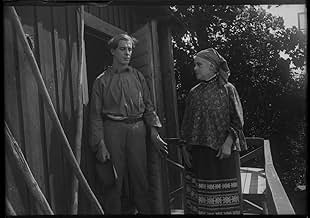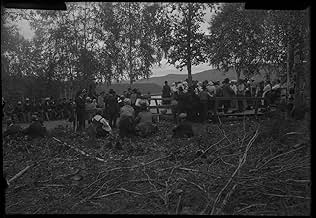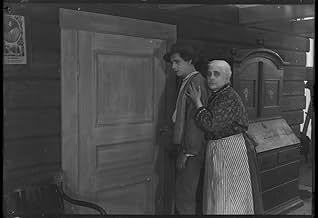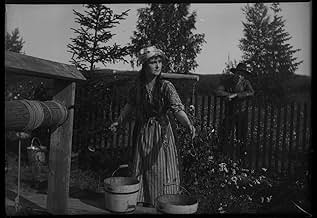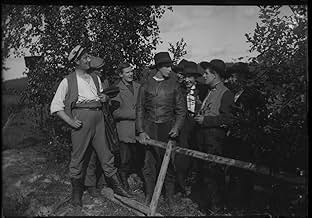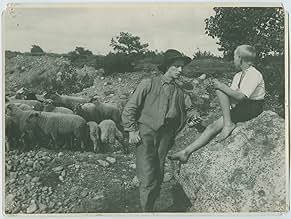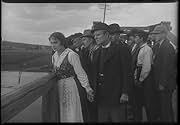NOTE IMDb
6,8/10
298
MA NOTE
Ajouter une intrigue dans votre langueOlof Koskela is the son of a rich farmer. He seduces young girls at random, until an inconsistent gesture rushes him away from home and his carefree lifestyle. Based on the 1905 novel by Fin... Tout lireOlof Koskela is the son of a rich farmer. He seduces young girls at random, until an inconsistent gesture rushes him away from home and his carefree lifestyle. Based on the 1905 novel by Finnish author Johannes Linnankoski.Olof Koskela is the son of a rich farmer. He seduces young girls at random, until an inconsistent gesture rushes him away from home and his carefree lifestyle. Based on the 1905 novel by Finnish author Johannes Linnankoski.
Lillebil Ibsen
- Elli
- (as Lillebil Christensen)
Ernst Brunman
- Café Guest
- (non crédité)
Arvid Dahlberg
- Timber Raft Man
- (non crédité)
Bengt Djurberg
- Young Man
- (non crédité)
Emil Fjellström
- Café Guest
- (non crédité)
Mona Geijer-Falkner
- Maid
- (non crédité)
Paul Hagman
- Timber Raft Man
- (non crédité)
Doris Nelson
- Prostitute
- (non crédité)
Karl Persson
- Lars Hanson's Double
- (non crédité)
Tekla Sjöblom
- Maid
- (non crédité)
Histoire
Le saviez-vous
- AnecdotesMauritz Stiller (1883 - 1928) is, along with Victor Sjöström, the big name in Swedish silent film. He grew up in Helsinki, but traveled to Sweden at a young age, where he was active both as an actor and director. He made his directorial debut in 1912 with Mother and Daughter. During the years 1912-1916, he directed no less than 34 films, of which Vingarne (1916) is the most notable. But it was during the following years that he would make his very best films, such as Herr Arnes pengar (1919), Sången om den eldröda blomman (1919), Erotikon (1920) and the three-hour epic Gösta Berlings saga (1924), which became his last Swedish production before he traveled to Hollywood together with the film's star - Greta Garbo. He was involved in four American productions, but only Hotel Imperial (1928) was completed by himself. He then returned to Sweden where he died a short time later in the aftermath of a lung disease.
- ConnexionsFeatured in Minns Ni? (1993)
- Bandes originalesNR 1
Composed by Kristofer Stange
Commentaire à la une
"Sangen Om Den Eldröda Blomman" ( "Song Of The Scarlet Flower" ) was a recent and remarkable silent surprise for this Herr Von; the oeuvre is an excellent Herr Stiller silent film that this German count watched in a newly restored and tinted copy. It combines the well-known aesthetics, technical improvements and artistic merits for which the Nordic director was known and praised since those early silent times till today.
The film tells of the merry and carefree love life of young Olof ( Herr Lars Hanson ) a woodsman who during his search for true love, seduces many fauleins ( just like this German aristocrat well, not exactly because the purpose of this Herr Von's seduction of rich fräulein heiresses are their great fortunes ). He will suffer disappointment and deception, all those problems that turn up in any loving relationship. Finally he will find responsibility and maturity, learning during his particular quest that his actions always have consequences in different degrees to the people around him. This Herr Von can describe "Sangen Om " as a kind of coming of age film, the special introspective growth toward maturity of a free and easy youngster.
As this German count said before, the film displays Stiller's characteristic artistic virtues. ; in the first part of the film, we can see elements of comedy, not exactly like the comedy of intrigues in other Stiller films, but humor of a more cheerful sort, highlighting the self-involvement of our hero. Olof 's frivolous flirtations with the different girls eventually turn romantic and then turn into drama. There is conflict in the troubled relationship between Olof and his father and later with the father of his beloved. The beautiful and wild natural landscapes of Norrland and northern Sweden lend the tale a certain power and is characteristic of Herr Stiller's other silents where Nature emerges as an important character in the story. This is strongly reflected throughout the film but especially during the frantic scene wherein Olof descends into the troubled waters of a river, a beautiful metaphor for the hardships that our hero has to endure until he finds himself.
"Sangen Om Den Eldröda Blomman" is an excellent, beautiful film, a solid, technically perfect and intricate production of 1919 that demonstrates once again the importance of Herr Stiller for silent film history.
And now, if you'll allow me, I must temporarily take my leave because this German Count must return to Teutonic nature.
Herr Graf Ferdinand Von Galitzien http://ferdinandvongalitzien.blogspot.com/
The film tells of the merry and carefree love life of young Olof ( Herr Lars Hanson ) a woodsman who during his search for true love, seduces many fauleins ( just like this German aristocrat well, not exactly because the purpose of this Herr Von's seduction of rich fräulein heiresses are their great fortunes ). He will suffer disappointment and deception, all those problems that turn up in any loving relationship. Finally he will find responsibility and maturity, learning during his particular quest that his actions always have consequences in different degrees to the people around him. This Herr Von can describe "Sangen Om " as a kind of coming of age film, the special introspective growth toward maturity of a free and easy youngster.
As this German count said before, the film displays Stiller's characteristic artistic virtues. ; in the first part of the film, we can see elements of comedy, not exactly like the comedy of intrigues in other Stiller films, but humor of a more cheerful sort, highlighting the self-involvement of our hero. Olof 's frivolous flirtations with the different girls eventually turn romantic and then turn into drama. There is conflict in the troubled relationship between Olof and his father and later with the father of his beloved. The beautiful and wild natural landscapes of Norrland and northern Sweden lend the tale a certain power and is characteristic of Herr Stiller's other silents where Nature emerges as an important character in the story. This is strongly reflected throughout the film but especially during the frantic scene wherein Olof descends into the troubled waters of a river, a beautiful metaphor for the hardships that our hero has to endure until he finds himself.
"Sangen Om Den Eldröda Blomman" is an excellent, beautiful film, a solid, technically perfect and intricate production of 1919 that demonstrates once again the importance of Herr Stiller for silent film history.
And now, if you'll allow me, I must temporarily take my leave because this German Count must return to Teutonic nature.
Herr Graf Ferdinand Von Galitzien http://ferdinandvongalitzien.blogspot.com/
- FerdinandVonGalitzien
- 17 déc. 2009
- Permalien
Meilleurs choix
Connectez-vous pour évaluer et suivre la liste de favoris afin de recevoir des recommandations personnalisées
Détails
Box-office
- Budget
- 180 000 SEK (estimé)
- Durée2 heures 25 minutes
- Mixage
- Rapport de forme
- 1.33 : 1
Contribuer à cette page
Suggérer une modification ou ajouter du contenu manquant

Lacune principale
By what name was Le chant de la fleur écarlate (1919) officially released in Canada in English?
Répondre
